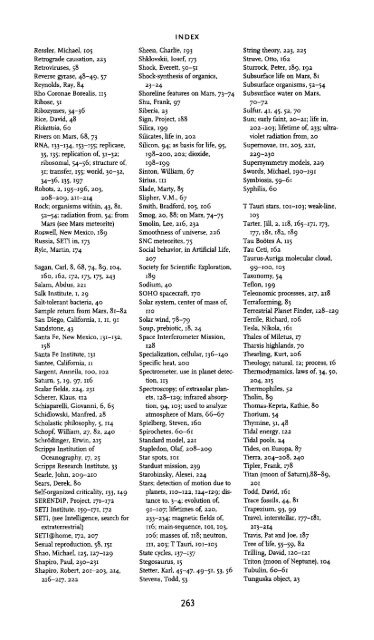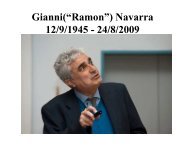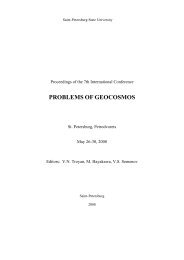- Page 2:
Here Be Dragons
- Page 6:
David Koerner Simon LeVay OXFORD UN
- Page 10:
Contents Acknowledgments vi Introdu
- Page 14:
Here Be Dragons
- Page 18:
Introduction V* At the Institute fo
- Page 22:
INTRODUCTION Sun—towers above the
- Page 26:
INTRODUCTION force and nature remai
- Page 30:
INTRODUCTION So terrestrial biology
- Page 34:
INTRODUCTION No amount of learned d
- Page 38:
1 Origins How Life on Earth Beganl
- Page 42:
ORIGINS longer periods of time: tha
- Page 46:
ORIGINS sistency of events happenin
- Page 50:
ORIGINS Lucretius, whose belief in
- Page 54:
ORIGINS After a week, he analyzed w
- Page 58:
ORIGINS Earth's history, the Sun wa
- Page 62:
ORIGINS supply should be biased tow
- Page 66:
ORIGINS There is a third possibilit
- Page 70:
ORIGINS good humor. And something s
- Page 74:
ORIGINS life that may have taken ho
- Page 78:
ORIGINS 1.3 Chemical structure of D
- Page 82:
ORIGINS leave it for 10 billion yea
- Page 86:
ORIGINS University of Colorado and
- Page 90:
ORIGINS RNA world to the RNA world,
- Page 94:
1 Going to Extremes The Habitats an
- Page 98:
GOING TO EXTREMES the bottom, that'
- Page 102:
GOING TO EXTREMES the cyanobacteria
- Page 106:
GOING TO EXTREMES tirely new hole,
- Page 110:
GOING TO EXTREMES surface, but ther
- Page 114:
GOING TO EXTREMES Japan. 6 To under
- Page 118:
GOING TO EXTREMES to methane lowers
- Page 122:
GOING TO EXTREMES thermophiles. If
- Page 126:
GOING TO EXTREMES 2.1 Carl Woese's
- Page 130:
GOING TO EXTREMES mains gave rise t
- Page 134:
GOING TO EXTREMES species, but a la
- Page 138:
GOING TO EXTREMES toskeleton of euk
- Page 142:
K The Incredible! Shrinking Martian
- Page 146:
THE INCREDIBLE SHRINKING MARTIANS c
- Page 150:
THE INCREDIBLE SHRINKING MARTIANS l
- Page 154:
THE INCREDIBLE SHRINKING MARTIANS w
- Page 158:
THE INCREDIBLE SHRINKING MARTIANS 3
- Page 162:
THE INCREDIBLE SHRINKING MARTIANS t
- Page 166:
THE INCREDIBLE SHRINKING MARTIANS C
- Page 170:
THE INCREDIBLE SHRINKING MARTIANS M
- Page 174:
THE INCREDIBLE SHRINKING MARTIANS 3
- Page 178:
THE INCREDIBLE SHRINKING MARTIANS f
- Page 182:
THE INCREDIBLE SHRINKING MARTIANS C
- Page 186:
THE INCREDIBLE SHRINKING MARTIANS i
- Page 190:
THE INCREDIBLE SHRINKING MARTIANS s
- Page 194:
THE INCREDIBLE SHRINKING MARTIANS p
- Page 198:
E -m The Death and Life of Stars Or
- Page 202:
THE DEATH AND LIFE OF STARS Nichola
- Page 206:
THE DEATH AND LIFE OF STARS Orion i
- Page 210:
THE DEATH AND LIFE OF STARS gravity
- Page 214:
THE DEATH AND LIFE OF STARS flowing
- Page 218:
THE DEATH AND LIFE OF STARS the inf
- Page 222:
THE DEATH AND LIFE OF STARS likely
- Page 226:
THE DEATH AND LIFE OF STARS been ev
- Page 230: THE DEATH AND LIFE OF STARS duced t
- Page 234: ] The Planet Finders Searching for
- Page 238: THE PLANET FINDERS Conceptually, th
- Page 242: THE PLANET FINDERS astronomical his
- Page 246: THE PLANET FINDERS star at a distan
- Page 250: THE PLANET FINDERS mass of about th
- Page 254: THE PLANET FINDERS whether "M stars
- Page 258: THE PLANET FINDERS was orbiting the
- Page 262: THE PLANET FINDERS Algol's stellar
- Page 266: THE PLANET FINDERS fronts) of the l
- Page 270: THE PLANET FINDERS seconds, which m
- Page 274: THE PLANET FINDERS tain spectra of
- Page 278: 4 What Happens in Evolution Chance
- Page 284:
HERE BE DRAGONS each other to produ
- Page 288:
HERE BE DRAGONS Joyce is more equiv
- Page 292:
Life within rock. Above: University
- Page 296:
The Orion nebula, in a Hubble Space
- Page 300:
Planet birth This is a young star,
- Page 304:
Creatures of the Burgess shale. A f
- Page 308:
HERE BE DRAGONS With K greater than
- Page 312:
HERE BE DRAGONS bodies. Just in the
- Page 316:
HERE BE DRAGONS early work, was a h
- Page 320:
HERE BE DRAGONS creatures into exis
- Page 324:
HERE BE DRAGONS vant. My suspicion
- Page 328:
HERE BE DRAGONS the level of DNA. T
- Page 332:
HERE BE DRAGONS involved diversific
- Page 336:
HERE BE DRAGONS slopes of that peak
- Page 340:
HERE BE DRAGONS maining eight 2-bas
- Page 344:
HERE BE DRAGONS converged on it. Bu
- Page 348:
HERE BE DRAGONS worth spending a li
- Page 352:
HERE BE DRAGONS it also has somethi
- Page 356:
HERE BE DRAGONS alize his plans. Wi
- Page 360:
HERE BE DRAGONS "magic frequencies.
- Page 364:
HERE BE DRAGONS and not finding one
- Page 368:
HERE BE DRAGONS age. Hence SETI res
- Page 372:
HERE BE DRAGONS when we moved the t
- Page 376:
HERE BE DRAGONS each 0.6 hertz wide
- Page 380:
HERE BE DRAGONS The Nobel Prize win
- Page 384:
HERE BE DRAGONS of the Earth's orbi
- Page 388:
HERE BE DRAGONS ferometry to planet
- Page 392:
HERE BE DRAGONS (which may extend a
- Page 396:
HERE BE DRAGONS dictions have contr
- Page 400:
HERE BE DRAGONS After 20 miles, an
- Page 404:
HERE BE DRAGONS said, he had been h
- Page 408:
HERE BE DRAGONS people with no real
- Page 412:
HERE BE DRAGONS Nevertheless, the r
- Page 416:
HERE BE DRAGONS nesses on the groun
- Page 420:
HERE BE DRAGONS Our very own UFO Or
- Page 424:
HERE BE DRAGONS hydraulics so it co
- Page 428:
HERE BE DRAGONS Silicon sits right
- Page 432:
HERE BE DRAGONS restrial biochemist
- Page 436:
HERE BE DRAGONS Feinberg and Shapir
- Page 440:
HERE BE DRAGONS Tierra, a computer
- Page 444:
0HERE BE DRAGONS harder and harder
- Page 448:
HERE BE DRAGONS have a certain resp
- Page 452:
HERE BE DRAGONS Chinese is put in a
- Page 456:
HERE BE DRAGONS loading technology
- Page 460:
HERE BE DRAGONS creator on the line
- Page 464:
HERE BE DRAGONS formational systems
- Page 468:
HERE BE DRAGONS mind. 16 Richard Ca
- Page 472:
HERE BE DRAGONS "An obvious fix," F
- Page 476:
HERE BE DRAGONS ters by one. "We sh
- Page 480:
HERE BE DRAGONS habit is not all th
- Page 484:
HERE BE DRAGONS ground radiation fr
- Page 488:
HERE BE DRAGONS ground does indeed
- Page 492:
HERE BE DRAGONS in the fabric of sp
- Page 496:
HERE BE DRAGONS wise be seen. The M
- Page 500:
HERE BE DRAGONS has recently offere
- Page 504:
HERE BE DRAGONS provides evidence f
- Page 508:
CONCLUSIONS will—it is a fundamen
- Page 512:
CONCLUSIONS nology to assemble DNA-
- Page 516:
CONCLUSIONS soon as circumstances p
- Page 520:
CONCLUSIONS We believe that this ar
- Page 524:
CONCLUSIONS rolls. Or maybe we'll c
- Page 528:
NOTES TO CHAPTER 1 "Before Enzymes
- Page 532:
NOTES CHAPTER 3 13 J.L. Bada, et al
- Page 536:
NOTES CHAPTER 5 3 A. Wolszczan, "Co
- Page 540:
NOTES CHAPTER 7 14 E. Jones, "Where
- Page 544:
NOTES TO CONCLUSIONS (Cambridge: Ha
- Page 548:
Big Pine, California, 193 Bios Grou
- Page 552:
INDEX 161-162,166-168,175 Greenhous
- Page 556:
Networks, Boolean, 136-140 Neumann,
- Page 560:
Turing, Alan, 209 UCLA, 2 Ufomind,













